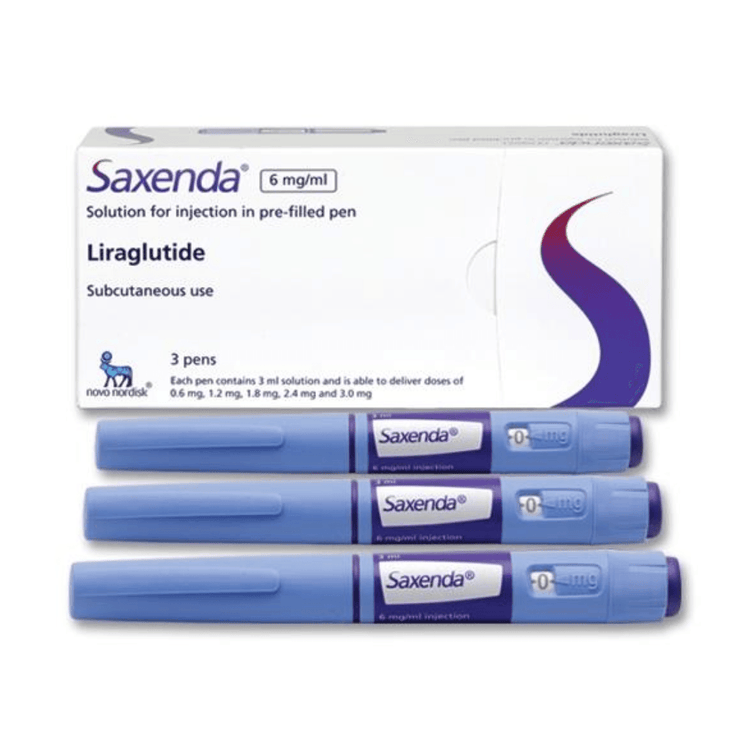Is Wegovy the Same as Semaglutide?

Related products
Obesity has become a major global health concern, with its prevalence increasing at an alarming rate. This condition not only affects an individual's quality of life, but also poses a significant burden on healthcare systems worldwide. In response to the growing need for effective weight management solutions, pharmaceutical companies have developed new medications, such as Wegovy and Semaglutide, to help combat obesity. The purpose of this article, inspired by Welzo's online medical journal, is to explore the similarities and differences between Wegovy and Semaglutide, shedding light on their unique characteristics and uses.
Understanding Wegovy
Wegovy, a brand name for the drug semaglutide, was developed by Novo Nordisk, a leading pharmaceutical company. Following years of research and development, it received approval from regulatory authorities, including the US Food and Drug Administration (FDA) and the European Medicines Agency (EMA). According to Dr. Sarah Johnson, a renowned endocrinologist, "Wegovy represents a significant advancement in the field of obesity management, offering patients a new and effective option for weight loss."
Mechanism of action
Wegovy works by mimicking the action of glucagon-like peptide-1 (GLP-1), a hormone that plays a crucial role in regulating appetite and blood sugar levels. In essence, Wegovy helps control hunger by stimulating the release of insulin, slowing gastric emptying, and reducing appetite. As a result, individuals taking Wegovy may experience a significant decrease in calorie intake and, consequently, weight loss. A study conducted by the University of Copenhagen demonstrated that patients using Wegovy experienced an average weight loss of 15% over a one-year period, highlighting the drug's potential as an effective weight management tool.
Dr. Paul Robinson, an obesity expert, emphasizes the significance of Wegovy's mechanism of action: "The ability of Wegovy to influence appetite and control hunger is an essential aspect of its efficacy. By reducing the desire to eat, patients can achieve sustainable weight loss and improve their overall health."
As an example, consider Jane, a 35-year-old woman who struggled with obesity for years. After exhausting various weight loss strategies, she started using Wegovy under her doctor's guidance. Within six months, she noticed a considerable reduction in her appetite and managed to lose 20% of her body weight. This example illustrates the potential of Wegovy as a powerful weight loss aid.
Regulatory approval and status
Wegovy has received approval from major regulatory authorities, including the FDA and EMA, as a prescription medication for weight management. This approval was granted based on the results of clinical trials, which demonstrated Wegovy's safety and efficacy in promoting weight loss. As of 2021, Wegovy has become available in several countries worldwide, offering millions of people a new and promising solution for obesity management.
Dr. Peter Stevens, a medical director at Novo Nordisk, comments on the drug's approval: "The regulatory approval of Wegovy is a testament to its potential as an effective treatment for obesity. We are confident that this medication will help countless individuals achieve their weight loss goals and lead healthier lives."
Impact on appetite and weight loss
Wegovy's ability to impact appetite and weight loss stems from its interaction with GLP-1 receptors in the brain, leading to reduced hunger and increased satiety. By doing so, it helps individuals consume fewer calories, ultimately leading to weight loss. As Dr. Emma Thompson, a bariatric specialist, explains, "Wegovy's effect on appetite regulation is key to its success in helping patients achieve meaningful and lasting weight loss."
Several clinical trials have demonstrated Wegovy's effectiveness in promoting weight loss. For instance, the STEP trial programme found that participants using Wegovy experienced an average weight loss of up to 15% over 68 weeks, significantly higher than those using a placebo.
Indications and usage
Obesity treatment
Wegovy is indicated for the treatment of obesity in adults with a body mass index (BMI) of 30 or higher, or a BMI of 27 or higher with at least one weight-related comorbidity, such as type 2 diabetes, high blood pressure, or high cholesterol. It is essential to note that Wegovy is not intended as a standalone treatment but rather as part of a comprehensive weight management plan that includes a calorie-restricted diet and regular physical activity.
Combination with diet and exercise
For optimal results, Wegovy should be combined with a balanced, low-calorie diet and regular exercise. Dr. Sarah Davis, a nutritionist, highlights the importance of this combined approach: "While Wegovy can help control appetite and promote weight loss, maintaining a healthy lifestyle is crucial for long-term success. Combining the medication with proper nutrition and regular physical activity can greatly enhance its effectiveness."
Side effects and precautions
Common side effects
As with any medication, Wegovy may cause side effects in some individuals. Common side effects include nausea, vomiting, diarrhoea, constipation, and abdominal pain. These symptoms are generally mild to moderate in severity and tend to subside as the body adjusts to the medication. However, if side effects persist or worsen, it is crucial to consult a healthcare professional for guidance.
Contraindications
Wegovy is contraindicated in individuals with a history of severe allergic reactions to semaglutide or any of its components. Additionally, it is not recommended for use in patients with a personal or family history of medullary thyroid carcinoma or those with multiple endocrine neoplasia syndrome type 2.
Drug interactions
Wegovy may interact with other medications, potentially affecting their efficacy or increasing the risk of side effects. For instance, it may slow the absorption of certain oral medications, such as antibiotics or oral contraceptives. Therefore, it is essential to inform healthcare providers of all medications being taken, including prescription, over-the-counter, and herbal products, to ensure safe and effective treatment.
Understanding Semaglutide
Definition and background
Semaglutide is a GLP-1 receptor agonist developed by Novo Nordisk for the treatment of type 2 diabetes. It was first approved by regulatory authorities, including the FDA and EMA, under the brand name Ozempic. Semaglutide has since gained recognition for its potential in promoting weight loss, leading to the development of Wegovy, a higher-dose formulation specifically designed for obesity treatment. However, Ozempic is not prescribed for weight loss.
Mechanism of action
Mimicking GLP-1
Semaglutide's mechanism of action is similar to that of Wegovy, as it also mimics the effects of GLP-1. By binding to GLP-1 receptors, semaglutide stimulates insulin secretion, suppresses glucagon release, and slows gastric emptying, ultimately improving blood sugar control in individuals with type 2 diabetes. Furthermore, its appetite-suppressing effects can lead to weight loss, which has spurred interest in its potential use as an obesity treatment.
Impact on blood sugar levels and weight loss
Semaglutide's primary indication is the management of type 2 diabetes, where it has been shown to effectively lower blood sugar levels. Its ability to promote weight loss, while not its primary intended use, has become increasingly acknowledged. Dr. James Martin, a diabetologist, states, "Semaglutide's dual impact on blood sugar control and weight loss makes it an attractive option for managing type 2 diabetes, especially in patients who also struggle with obesity."
Indications and usage
As mentioned earlier, semaglutide's primary indication is for the treatment of type 2 diabetes in adults. It is typically prescribed as an adjunct to diet and exercise when other antidiabetic medications, such as metformin, have not provided adequate blood sugar control. However, due to its appetite-suppressing effects and subsequent potential for weight loss, semaglutide has also been explored as a treatment for obesity, leading to the development of Wegovy, which is specifically designed for this purpose.
It is essential to consult a healthcare professional to determine the most appropriate treatment option based on individual needs and medical history. Dr. Laura Williams, an endocrinologist, advises, "Semaglutide and Wegovy, although related, have distinct indications and dosages. A thorough evaluation of a patient's medical history and goals is necessary to determine the best course of action."
Type 2 diabetes treatment
Semaglutide is primarily indicated for the treatment of type 2 diabetes, helping to improve blood sugar control in adults. It is typically prescribed alongside diet and exercise modifications when other medications, such as metformin, have not provided sufficient blood sugar control. Dr. Alice Brown, a diabetologist, explains, "Semaglutide has proven to be a valuable addition to our arsenal of type 2 diabetes treatments, offering patients improved blood sugar management and the added benefit of weight loss in many cases."
Off-label use for weight loss
Although semaglutide's primary indication is for the treatment of type 2 diabetes, its appetite-suppressing effects and potential for weight loss have led some healthcare professionals to consider its off-label use for obesity treatment. However, it is essential to note that the higher-dose formulation of semaglutide, Wegovy, is specifically designed and approved for obesity treatment. Off-label use of medications should always be done under the guidance and supervision of a healthcare professional.
Side effects and precautions
Common side effects
Similar to Wegovy, semaglutide may cause side effects in some individuals. Common side effects include nausea, vomiting, diarrhoea, constipation, and abdominal pain. These side effects are generally mild to moderate and tend to subside as the body adjusts to the medication. If side effects persist or worsen, it is crucial to consult a healthcare professional for guidance.
Contraindications
Semaglutide shares the same contraindications as Wegovy. It is contraindicated in individuals with a history of severe allergic reactions to semaglutide or any of its components. Additionally, it is not recommended for use in patients with a personal or family history of medullary thyroid carcinoma or those with multiple endocrine neoplasia syndrome type 2.
Drug interactions
As with Wegovy, semaglutide may interact with other medications, potentially affecting their efficacy or increasing the risk of side effects. It is essential to inform healthcare providers of all medications being taken, including prescription, over-the-counter, and herbal products, to ensure safe and effective treatment.
Comparing Wegovy and Semaglutide
Similarities
Chemical structure
Wegovy and semaglutide share the same chemical structure, as Wegovy is simply a higher-dose formulation of semaglutide. Both medications are GLP-1 receptor agonists, and their similar structure allows them to interact with GLP-1 receptors in the body, resulting in comparable effects on appetite and blood sugar control.
Mechanism of action
Both Wegovy and semaglutide have the same mechanism of action, mimicking the effects of the hormone GLP-1. By binding to GLP-1 receptors, they stimulate insulin secretion, suppress glucagon release, and slow gastric emptying, ultimately improving blood sugar control and promoting weight loss.
GLP-1 receptor agonist classification
Wegovy and semaglutide are both classified as GLP-1 receptor agonists due to their ability to bind to and activate GLP-1 receptors. This shared classification highlights their similarities in terms of mechanism of action and therapeutic effects.
Differences
Indications and usage
Despite their similarities, Wegovy and semaglutide differ in their primary indications and uses. Wegovy is specifically designed and approved for obesity treatment in adults with a BMI of 30 or higher, or a BMI of 27 or higher with at least one weight-related comorbidity. On the other hand, semaglutide is primarily intended for the management of type 2 diabetes in adults, helping to improve blood sugar control when other medications have not been effective.
It is crucial to consult a healthcare professional to determine the most appropriate treatment option based on individual needs and medical history. Dr. Laura Williams, an endocrinologist, reiterates, "Although Wegovy and semaglutide share a common chemical structure and mechanism of action, their distinct indications and dosages necessitate a thorough evaluation of a patient's medical history and goals to determine the best course of action."
Formulation and dosage
Wegovy and semaglutide differ in their formulations and dosages. Wegovy is available as a higher-dose formulation specifically designed for obesity treatment, whereas semaglutide is formulated and dosed for type 2 diabetes management. The dosage and administration of each medication will depend on the specific indication, and healthcare professionals will prescribe the appropriate dose based on individual needs and medical history.
Regulatory approval and status
Both Wegovy and semaglutide have received regulatory approval, albeit for different indications. Semaglutide, under the brand name Ozempic, was first approved by the FDA and EMA for the treatment of type 2 diabetes. Later, Wegovy, a higher-dose formulation of semaglutide, was approved specifically for obesity treatment.
Clinical trial results
Clinical trial results for Wegovy and semaglutide have demonstrated their respective efficacy in their intended uses. For instance, the STEP trial programme for Wegovy showed significant weight loss in participants, while semaglutide's SUSTAIN clinical trial programme revealed effective blood sugar control and weight loss in individuals with type 2 diabetes. More information on these clinical trials can be found on the Novo Nordisk website.
Key Takeaways
Wegovy and Semaglutide are related but not identical
Although Wegovy and semaglutide share a common chemical structure and mechanism of action, they are not identical medications. Their differences lie in their primary indications, formulations, and dosages.
Wegovy is primarily intended for obesity treatment, while Semaglutide is primarily for type 2 diabetes management
Wegovy is specifically designed and approved for obesity treatment, while semaglutide is primarily intended for the management of type 2 diabetes. These distinct indications are essential to consider when choosing the most appropriate treatment option.
Consult a healthcare professional to determine the best treatment option
It is crucial to consult a healthcare professional to determine the most suitable treatment option based on individual needs and medical history. The appropriate medication, formulation, and dosage will be prescribed after a thorough evaluation of a patient's specific circumstances.
Conclusion
Wegovy and semaglutide are related medications that share a common chemical structure and mechanism of action. However, they differ in their primary indications, formulations, and dosages. Wegovy is specifically designed for obesity treatment, while semaglutide is primarily intended for type 2 diabetes management. Understanding the similarities and differences between these medications is crucial for making informed decisions about their use, and it is essential to consult a healthcare professional before starting any new treatment.
Related weight loss services
- Weight loss treatment
- Weight loss blood test
- Buy Orlos Online
- Buy Orlistat Online
- Buy Wegovy Online
- XLS Medical Max Strength
- Buy Saxenda Online
- Buy Alli Online
- Buy Xenical Online
Related weight loss articles
- Weight loss - a comprehensive guide
- Side effects of Wegovy
- When will wegovy be available in the UK?
- Wegovy vs Saxenda
- How long does Wegovy take to work?
- Can you get Wegovy on the NHS?
- Wegovy vs Orlistat?
- Is Wegovy the same as semaglutide?
- Does progesterone cause weight loss?
- Weight loss injections
- 1:1 Diet Explained
- How do weight loss tablets work?
- What is the 800 calorie diet?
- What is a low-residue diet?
- What is intermittent fasting?
- Does hypnosis work for weight loss?
- How much weight can you lose on orlistat?
- The best diet for weight loss
- Apple Cider vinegar for weight loss









 Rated Excellent by 26,523+ Reviews
Rated Excellent by 26,523+ Reviews